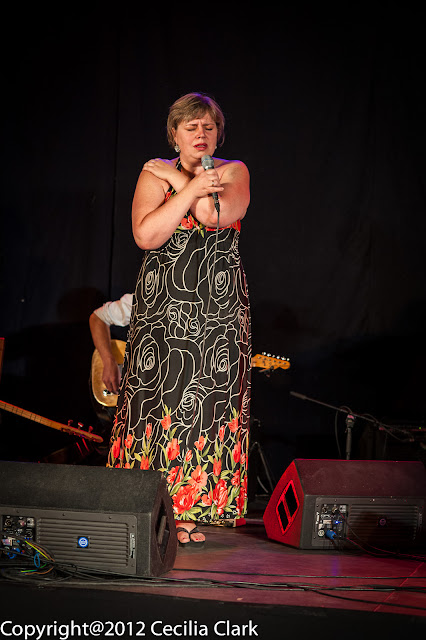This is the image we woke to Saturday morning. The photo is of the sun just peeking over the mountain that is behind Janče village. We stayed in this village in the Hotel Tutto which is located just across a small ravine from the main village. Janče is in Mavrovo National Park and it is located about 2-1/2 to 3 hours (120 km) southwest of Skopje.
Hotel Tutto was a wonderful, small bed & breakfast hotel (+389 (0) 42 470 999 or www.tutto.com.mk). The meals prepared by the restaurant were the best we've had in Macedonia. The first evening we had beefsteak (tender) with a wild mushroom sauce. The second day we ordered a slow-cooked lamb that needs at least 5 hours advance notice to prepare. We couldn't eat it all so we took the leftovers home with us.
The evening view from the restaurant terrace
Saturday, we hiked from the hotel through a wooded hillside about 3 km to the road. From there we walked about 4 km along the road to Sveti Jovan Bigorski (St. John the Baptist) Monastery. The monastery dates back to 1021, but the current version seems to be mostly from the 19th century.
19th century paintings on the outside of the church wall
Fresco painting of St. Cyril and St. Metodius (creators of the Cyrillic alphabet)
Mountain spring water cooling watermelons
On the 7-kilometer walk back to Hotel Tutto we surprised a Balkan Chamois (wild goat). He/she saw us and bounded up the mountain about 15 meters or so. I saw only a flash of medium-brown flash as it moved. When it stopped, I could see it through the trees with its facial striping and horns.
We also saw a small wild fire just below the hotel. At the hotel, there was no power because the fire was threatening the village's power plant. After a short, sweaty rest, we drove to the village of Rostuša to visit a nearby waterfall. The village isn't far, but it is uphill. The waterfall is only 1020 meters (1.2 km) from the road. Unfortunately, Dan and I missed a small backwards fork in the trail and went many more kilometers out of our way and back until we found the right trail.
We also saw a small wild fire just below the hotel. At the hotel, there was no power because the fire was threatening the village's power plant. After a short, sweaty rest, we drove to the village of Rostuša to visit a nearby waterfall. The village isn't far, but it is uphill. The waterfall is only 1020 meters (1.2 km) from the road. Unfortunately, Dan and I missed a small backwards fork in the trail and went many more kilometers out of our way and back until we found the right trail.
The waterfall is in Rostuška River canyon. Once the correct fork is found, the trail is lovely and shaded. It runs along a small rivulet to various small cascades. Duf Waterfall is at the trail's end.
This little canyon is cooler than any of the surrounding area. There are picnic tables scattered along the river and it is quite photogenic. After finding this waterfall so late in the day, Dan and I returned Sunday morning to take photographs with morning light. It was beautiful.
Sunday, after the waterfall visit and breakfast, we continued southwest toward Debar to see the Sveti Gergi (St. George) monastery which is a nunnery.
The only word I can think of to describe this small 19th century church is charming. It is lovingly cared for by the nuns that live in the surrounding dormitory. The inside frescos took 4 years to complete and they are extraordinary. The monastery sits above the Debar Lake.
A few more photos at Flickr















































